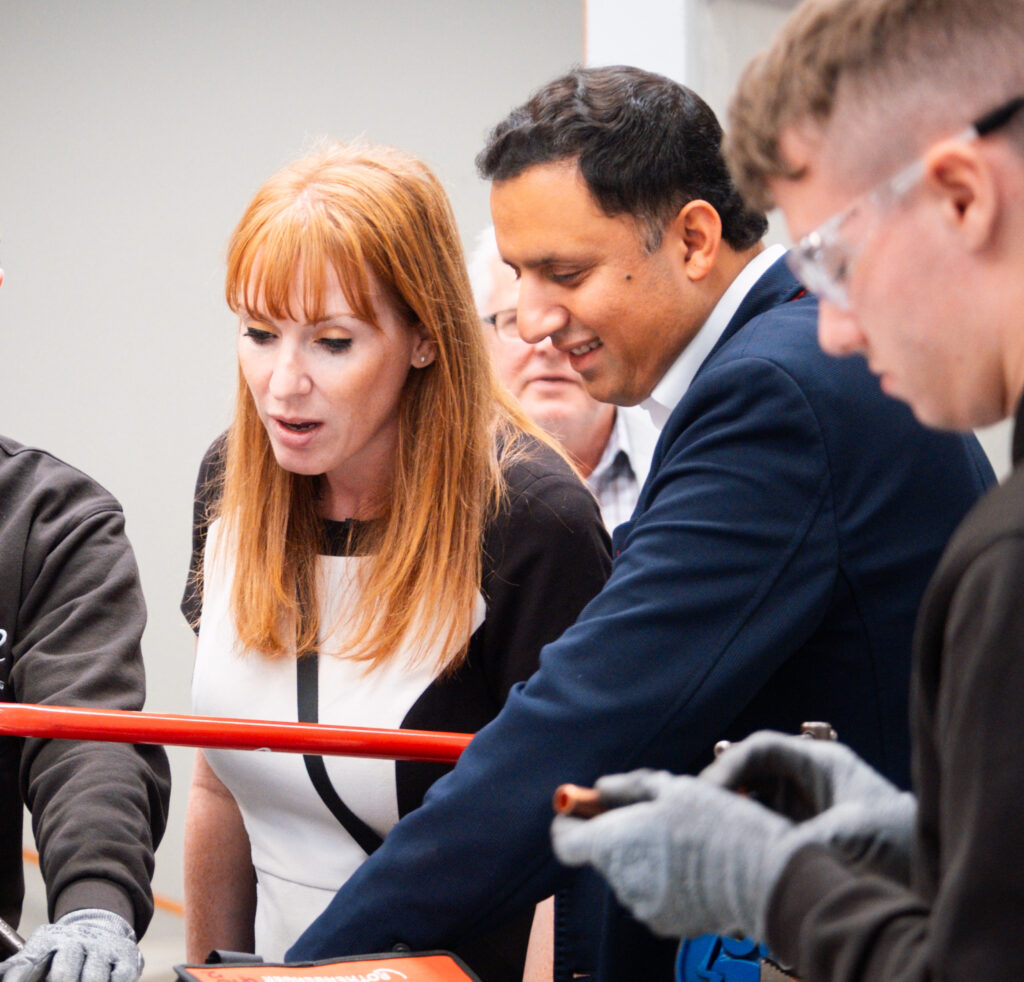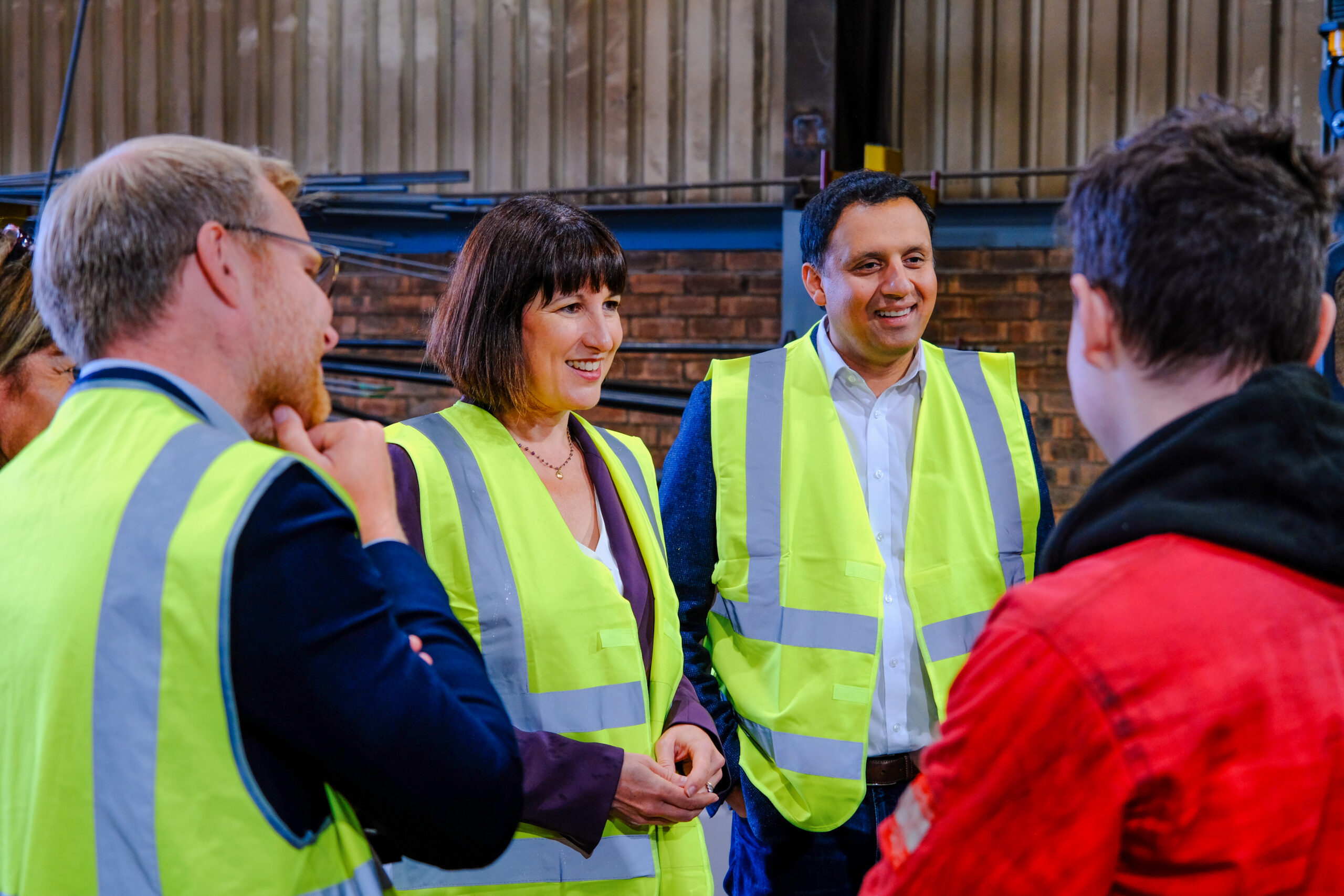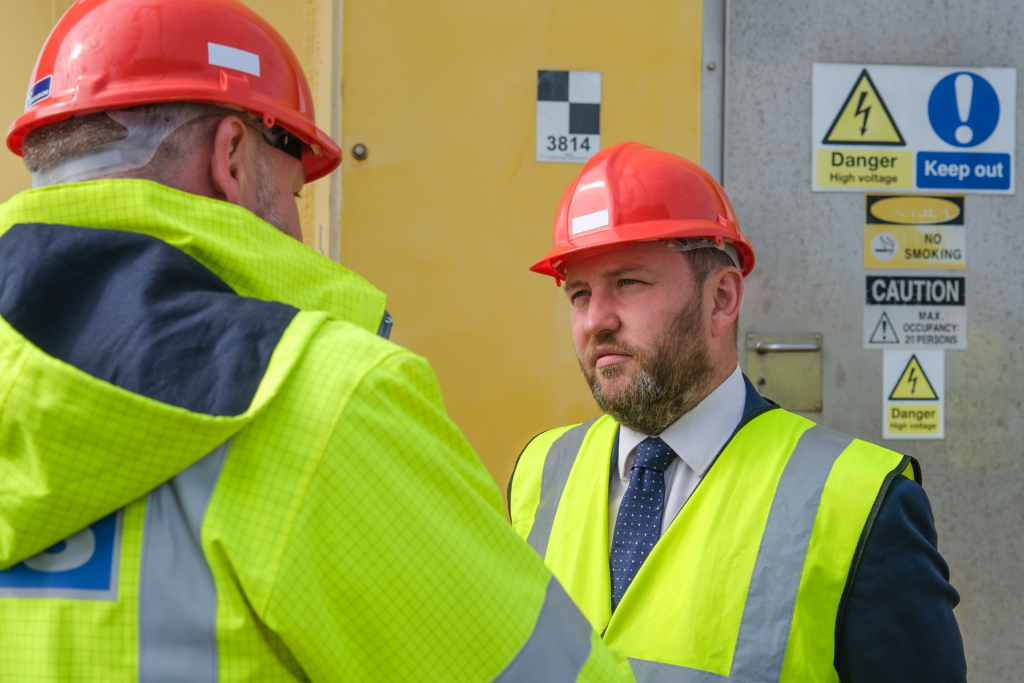Kickstart economic growth

How Labour will kickstart economic growth:
- Deliver economic stability for households with tough spending rules
- A new partnership with business to boost growth everywhere
- A new industrial strategy that supports Scotland’s growth sectors
- A National Wealth Fund to invest in jobs
- Planning reform to get Scotland building
- A New Deal for Working People that will make work pay
Skip to:
Sustained economic growth is the only route to improving the prosperity of our country and the living standards of working people. The Labour Party has a proud legacy of delivering social change in our country, but we know that that this is only possible if it is backed up by a strong economy.
That is why economic growth is Labour’s first mission for government. It means being pro-business and pro-worker. We are the party of wealth creation.
This election follows the chaos of the Conservatives’ ‘mini-budget’ and an unprecedented fall in living standards. This damage has been exacerbated by the miserable economic record of both the Conservatives and the SNP, which has seen a flatlining of wages and productivity leaving Scottish families worse off. Scotland is being failed by two governments which do not understand economic growth.
The Conservatives have failed to deliver because of their inability to accept that a strong economy can only be built on the contribution of every community and every person – the many not the few. Second, that sustainable growth requires government to be a strategic partner with business. Markets must be shaped, not merely served. Meanwhile, the SNP has failed to use the powers of the Scottish Government to grow Scotland’s economy and has instead presided over low growth and low productivity.
The result has been insecurity in the financial resilience of households but also in Scotland’s economy. At the very time when our world has become less stable and secure, both of Scotland’s governments have failed to respond, unable to grasp the trade-offs involved with a new era of rising global competition and tension, and leaving our economy on an increasingly shallow and insecure footing.
It is time to turn the page. Labour will restore stability, increase investment, and reform our economy.
A UK Labour government, with Rachel Reeves as Chancellor, will embrace a new approach to economic management – securonomics – that understands sustainable growth relies on a broad base and resilient foundations. Our approach will depend on a dynamic and strategic state. This does not mean ever-growing government, but it does mean a more active, smarter UK government that works in partnership with business, trade unions, local leaders, and devolved governments.
In our Business Case for Scotland, Scottish Labour has also set out our plans to support the economy in the devolved context. We believe that the Scottish government needs to work better in partnership, planning strategically for our economy and using its convening power to bring workers, organisations and business together to overcome barriers and realise opportunities.
Labour will stop the chaos and support business through a stable policy environment in Scotland and across the UK. At a UK level, Labour will strengthen our economic institutions, and in Scotland we will streamline the cluttered landscape of agencies and strategies, giving investors the certainty they need to fuel growth. We will strategically use public investment where it can unlock additional private sector investment, create jobs, and provide a return for taxpayers.
Parts of our economy will also require substantial reform if we are to create the wealth our country needs. Scotland is hampered by a planning regime that means we struggle to build the infrastructure and housing the country needs.
The country remains too centralised, with the economic potential of too many regions and communities across Scotland ignored. Our labour market fails to provide secure jobs and, as a result, for far too many people, particularly in the everyday economy, work does not pay.
The innovation, dynamism and sheer hard work of Scottish business and workers has never been in question. The next Labour government will work with them to kickstart economic growth and rebuild our country.

Strategic partnership through industrial strategy
Labour will introduce a new industrial strategy for the UK, which is mission-driven and focused on the future. We will work in partnership with industry to seize opportunities and remove barriers to growth. Critically, we will end short-term economic policy making at a UK level with the establishment of a UK Industrial Strategy Council, on a statutory footing, to provide expert advice. We will ensure representation on the Council from Scotland, as well as business and trade unions, to drive economic growth in all parts of the country.
UK Labour will take a sectoral approach, backing what makes our country great and where we enjoy advantages over other countries: our excellent research institutions, professional services, advanced manufacturing, and creative industries. We will ensure a pro-business environment, with a competition and regulatory framework that supports innovation, investment, and high-quality jobs. Procurement and trade policy will also be aligned with our industrial strategy priorities. In opposition, UK Labour has worked with the automotive, life sciences, and creative sectors on the approach we will take so they have certainty over the policies that will apply to them. A UK Labour government will set out plans for these and other vital sectors of the economy.
Financial services are one of Scotland’s greatest success stories – home to the second largest hub after London. Labour will create the conditions to support innovation and growth in the sector, through supporting new technology, including Open Banking and Open Finance and ensuring a pro-innovation regulatory framework.
Scottish Labour has also identified key sectors in which we believe Scotland has huge potential – our green energy industries, our tech and innovation sectors, and harnessing the economic power of our unique national brand. Too often our politics in Scotland has focused on what we cannot do, rather than what we can. Scottish Labour is committed to using the many devolved levers we have, including skills, regulation, regional development, enterprise agencies and technology so they are working to deliver on the economic potential of Scotland and its people, not holding us back.

Boosting investment
Business has for too long been hampered by governments that do not work with it. As a result, investment in Scotland and the UK is too low. Public investment, where it supports and de-risks additional private investment, is one important tool being used successfully across the world. It can create good jobs across the country and would mean Scottish taxpayers can reap the benefits of economic growth. To realise these opportunities Labour will establish a National Wealth Fund for the UK.
Capitalised with £7.3 billion over the course of the next UK parliament, the National Wealth Fund will have a remit to support Labour’s growth and clean energy missions, making transformative investments in Scotland and across the UK. The fund will have a target of attracting three pounds of private investment for every one pound of public investment, creating jobs across the country. Labour’s National Wealth Fund plans to allocate:
- £1.8 billion to upgrade ports in Scotland and across the UK and build supply chains here
- £1.5 billion to new gigafactories so our automotive industry leads the world
- £2.5 billion to rebuild our steel industry
- £1 billion to accelerate the deployment of carbon capture
- £500 million to support the manufacturing of green hydrogen.
Scotland’s huge energy potential means we have the conditions to benefit substantially from this investment, supporting jobs and businesses in communities right across our country.
Labour will also act to increase investment from pension funds in UK markets. We will adopt reforms to ensure that workplace pension schemes take advantage of consolidation and scale, to deliver better returns for savers and greater productive investment for UK PLC. A UK Labour government will also undertake a review of the pensions landscape to consider what further steps are needed to improve pension outcomes and increase investment in UK markets.

Business taxation
The business tax regime matters for investors. It is not just the rates of tax that matter, but also certainty. Under the Conservatives there has been constant chopping and changing – corporation tax has changed 26 times – and multiple fiscal events have made drastic changes often at little notice.
Labour will stop the chaos and turn the page with a strategic approach that gives certainty and allows long-term planning. At a UK level, we are committed to one major fiscal event a year, giving families, businesses and devolved government in Scotland due warning of tax and spending changes. We will publish a roadmap for business taxation for the next UK parliament which will allow businesses to plan investments with confidence.
Labour will cap UK corporation tax at the current level of 25 per cent, the lowest in the G7, for the entire parliament, and we will act if tax changes in other countries pose a risk to UK competitiveness. We will retain a permanent full expensing system in the UK for capital investment and the annual investment allowance for small business. And we will give firms greater clarity on what qualifies for allowances to improve business investment decisions.
The current business rates system in Scotland disincentivises investment, creates uncertainty and places an undue burden on our high streets. Scottish Labour has set out proposals to make business rates fairer, starting with reforms that level the playing field between the high street and online giants. We want to create a new system that will better incentivise investment, tackle empty properties and support entrepreneurship.

Innovation
Delivering growth and raising productivity depend on fresh thinking and new ideas. Technological advancement and innovation have the ability to transform our economy in ways that are yet to be embraced. Scotland has many cutting-edge businesses, but innovation needs to be converted into commercial success in every corner of our country. Labour will make Scotland and the UK the best place to start and grow a business.
At a UK level, we will ensure our industrial strategy supports the development of the Artificial Intelligence (AI) sector, and we will create a National Data Library to bring together existing research programmes, helping deliver data-driven public services, while maintaining strong safeguards and ensuring everyone benefits.
UK Labour will scrap short funding cycles for key R&D institutions in favour of ten-year budgets that allow meaningful partnerships with industry to keep Scotland and the UK at the forefront of global innovation. A UK Labour government will work with universities to support spinouts; and work with industry to ensure start-ups have the access to finance they need to grow. We will also simplify the UK procurement process to support innovation and reduce micromanagement with a mission-driven approach.
Regulators are currently ill-equipped to deal with the dramatic development of new technologies, which often cut across traditional industries and sectors. Labour will create a new Regulatory Innovation Office, bringing together existing functions across the UK government. This office will help regulators update regulation, speed up approval timelines, and co-ordinate issues that span existing boundaries. UK Labour will ensure the safe development and use of AI models by introducing binding regulation on the handful of companies developing the most powerful AI models and by banning the creation of sexually explicit deepfakes.
Scotland’s technology sector has huge potential but it needs a Scottish Government that is active in helping it develop. Scottish Labour has been clear that we need to reform Scotland’s enterprise agency landscape so that it is better aligned to deliver innovation, upskill workers, and attract investment to support the sector. Scottish Labour also believes that there is a key role for government in Scotland to plan for the digital and tech skills the industry needs and to push productivity gains out across our economy. Where possible this should be done in co-operation with the plans of a UK Labour government so that Scottish businesses benefit from Labour’s mission-driven approach.
Across Scotland and the UK, Labour will support diverse business models which bring innovation and new products to the market, including the co-operative sector. Scottish Labour will aim to double the size of Scotland’s co-operative and mutuals sector, working with them to address the barriers they face, such as accessing finance.
Small business
Labour’s plans for economic growth in both Scotland and the UK have been developed with businesses of all sizes in mind. Scotland is an SME economy, but small firms, entrepreneurs, and the self-employed face unique challenges that need reform from UK and Scottish governments.
At a UK level, Labour will take action on late payments to ensure small businesses and the self-employed are paid on time. We will improve guidance and remove barriers to exporting for small businesses. Reform of the British Business Bank, including a stronger mandate to support growth in the regions and nations, will make it easier for small and medium sized enterprises to access capital. We will also reform procurement rules to give them greater access to government contracts.
Within Scotland, we want to reform the business support system so it can provide small businesses with targeted and stage-specific advice. By streamlining support, business will be able to better access skills development schemes, capital support, and help to adopt tech that will improve productivity and growth.
The Post Office is an essential service in communities across the country. UK Labour will look for ways to strengthen the Post Office, in consultation with sub-postmasters, trade unions and customers, and support the development of new products, services and business models, such as banking hubs, that will help reinvigorate the high street in communities across Scotland and UK.
Scottish Labour backed overturning the wrongful convictions of sub-postmasters shamefully affected by the Horizon IT scandal in Scotland; and at a UK level, Labour will ensure justice and compensation are delivered swiftly for them.

Economic infrastructure
Across the UK, major infrastructure projects have been abandoned or delayed. Cost overruns and uncertainty over supply chains have become commonplace as the Conservative government U-turned on commitments. In Scotland, schools, hospitals, public transport, and roads are all under threat because of the SNP’s economic and fiscal mismanagement. Crucial transport projects have been kicked into the long grass or severely delayed. Failures to process planning applications mean Scotland has missed out on crucial renewables projects and housebuilding is grinding to a halt.
Labour will end this chaos by developing a ten-year infrastructure strategy for the UK. This will be aligned with our UK industrial strategy and local development priorities. The strategy will guide UK investment plans and give the private sector certainty about the project pipeline. We will work closely with business to map and address the delivery challenges we face. We will create a new National Infrastructure and Service Transformation Authority, bringing together existing bodies, to set strategic infrastructure priorities and oversee the design, scope, and delivery of projects.
UK Labour will also ensure that economic regulation supports growth and investment, promotes competition, works for consumers, and enables innovation.
In an ever more connected world, our communication network is also vital. Under the Conservatives, UK investment in 5G is falling behind other countries and the rollout of gigabit broadband has been slow. Similarly, the SNP has failed to deliver on its promises for the R100 programme. UK Labour will make a renewed push to fulfil the ambition of full gigabit and national 5G coverage by 2030.
Royal Mail remains a key part of the UK’s infrastructure. Labour will ensure that any proposed takeover is robustly scrutinised and that appropriate guarantees are forthcoming that protect the interests of the workforce, customers and the United Kingdom, including the need to maintain a comprehensive universal service obligation – which is particularly important to people in rural Scotland.
Labour will also explore new business and governance models for Royal Mail so that workers and customers who rely on Royal Mail services can have a stronger voice in the governance and strategic direction of the company.
A modern transport network
Throughout Scotland we need to modernise our transport infrastructure. Long promised improvements to the road network by the SNP have not been delivered. Ferry projects have run over time and over budget, islanders struggle with cancelled journeys, and passengers on Scotland’s railways face steep fare hikes. Thousands of bus services have been cut, meaning people – especially in rural areas – do not have access to affordable public transport.
Despite long-standing promises to integrate transport systems, transport services across Scotland have remained fragmented and inefficient, with companies and sectors failing to speak to and plan with each other. Bus routes in Scotland have collapsed while the SNP has stood idly by. Scottish Labour campaigned for powers over bus services to be devolved to local authorities and we are committed to seeing locally controlled and owned bus services, with capped fares and integrated travel systems across our towns and cities.
Cars remain by far the most popular form of private transport. We need to maintain and renew our road network and we have long-term commitments to upgrade key routes in Scotland like the A9. We want to support the transition to electric vehicles and the rollout of charge points across Scotland. At a UK level, as set out in our automotive sector plan, Labour will also give certainty to manufacturers by restoring the phase-out date of 2030 for new cars with internal combustion engines, and supporting buyers of second-hand electric cars by standardising the information supplied on the condition of batteries. We will also further support drivers by tackling the soaring cost of car insurance.
Scottish Labour believes the public ownership of ScotRail was an opportunity to transform Scotland’s railway for the benefit of passengers, but the Scottish government has overseen cuts to routes and hiked fares. A UK Labour government will bring the rest of the UK’s railways into public ownership as contracts with existing operators expire or are broken through a failure to deliver. This approach will not cost taxpayers a penny in compensation to the train companies, but will allow Labour to create GB Railways, a unified system that relentlessly focuses on safe, accessible, reliable, affordable and efficient services. GB Railways will then work hand-in-hand with ScotRail to deliver routes across Scotland and improve standards for passengers. Open access operators are an important part of the rail system and will have an ongoing role, but Labour’s plans will mean that all railways, including Network Rail and all routes into and throughout Scotland, finally work for public and passenger benefit.
Labour will also work with Scotland’s aviation industry to secure its long-term future, including through promoting sustainable aviation fuels and encouraging airspace modernisation. Scottish Labour wants to partner with the industry to attract more international routes into Scotland to support our tourism strategy and our plans to promote ‘Brand Scotland’.

Get Scotland building
Planning is devolved in Scotland, but the broken system is holding back development in our cities and rural areas. Scotland faces a housing shortage, however developers who want to build homes face bureaucratic and lengthy planning processes. Businesses which want to locate and invest in Scotland come up against challenges in securing appropriate bases. Scotland has the potential to become a world leader in clean energy, but the process for consenting and approving renewable energy projects is too slow and unpredictable for investors. Without change, Scotland risks losing out on investment and opportunities, hampering our growth and holding back our potential.
Scottish Labour wants to transform our planning system so that it is no longer a barrier to development – but an enabler of economic growth. To deliver this we have proposed reforming Scotland’s National Planning Framework 4 to ensure that it aligns with our long-term strategic objectives on growth, housing, and net zero. It should also encourage consideration of the potential for economic growth and job creation.
We would also increase capacity in the wider system to reduce timescales and provide greater certainty for developers. Scottish Labour would create a national planning agency with expertise and specialist planning teams that local governments can draw on to supplement local departments. Decision making would remain local, but this national resource would be available to help communities deal with large and complex projects. Over the long term, through the skills system, Scottish Labour would seek to create a pipeline of town planners to boost expertise within local councils.
Scottish Labour would also work with local authorities to streamline the process for strategically important projects. We plan to explore options for greater use of regional planning and enterprise zones to identify key areas for development, learning from the success of areas like Clyde Gateway. Our new approach will prioritise the development of suitable brownfield land, but also unlock ugly, disused grey belt land for housing and construction where it is suitable. Scottish Labour also believes we should review the fees structure and timescales across the country. As well as options to direct additional resource into the system, reforms should aim to increase flexibility for small businesses and allow councils to make a full cost recovery when deadlines are met.
If we are to unlock Scotland’s potential, we need to give certainty to investors and developers. Our new approach to planning will improve Scotland’s competitiveness and support the creation of communities that are enjoyable to live in, with quality housing, sustainable innovation and thriving enterprises which support good jobs.
Immigration
People who have come to the UK to work have made a substantial contribution to our economy, to our public services and our communities in which they live. But under the Conservatives and the SNP, our economy has become overly dependent on workers from abroad to fill skills shortages. As a result, we have seen net UK migration reach record highs; more than triple the level than at the last election in 2019. The overall level must be properly controlled and managed. Failure to do so reduces the incentives for businesses to train locally. So, Labour will reduce UK net migration.
We will reform the points-based immigration system so that it is fair and properly managed, with appropriate restrictions on visas, and by linking immigration and skills policy. Labour will not tolerate employers or recruitment agencies abusing the visa system, and we will not stand for breaches of employment law. Employers who flout the rules will be barred from hiring workers from abroad.
Conservative and SNP policy is incoherent, with decisions on migration, skills and sectoral pay determined in isolation. Labour will bring joined-up thinking, ensuring that migration to address skills shortages triggers a plan to upskill workers and improve working conditions in the UK. We will strengthen the Migration Advisory Committee, and establish a framework for joint working with skills bodies across the UK, the Industrial Strategy Council and the Department for Work and Pensions. The needs of our economy are different across the regions and nations, and different sectors have different needs. Given skills policy and employment support are devolved we will work with the Scottish Government when designing workforce plans for different sectors. This will ensure our migration and skills policies work for every part of the UK. We will end the long-term reliance on overseas workers in some parts of the economy. The days of a sector languishing endlessly on the shortage occupation lists with no action to train up workers will come to an end.

Supporting people into work
Too many people are out of work or not earning enough. In Scotland and across the UK, long waits for treatment of health conditions, particularly mental health, are contributing to the rise in economic inactivity.
Employment support is largely devolved in Scotland, but we believe there is scope for better joined-up working to help people into good jobs. Under a UK Labour government, there will be a new approach to Jobcentre Plus so that it focuses on helping people into work and helping them get on at work. In Scotland we will partner effectively with devolved provision, with more proactive working with local and devolved services so that job centres are responsive to local employers, inclusive for all users and offer the best opportunities for people right across the country. The SNP has cut the funding for Scotland’s young person’s guarantee, but a UK Labour government will work collaboratively with the Scottish Government to ensure all reserved aspects of Labour’s youth guarantee effectively support young people in Scotland.
Labour also wants to support more people with health conditions or a disability into the workforce. A UK Labour government will tackle the backlog of Access to Work claims and give disabled people the confidence to try out work without the fear of an immediate benefit reassessment if it does not work out. We believe the UK Work Capability Assessment is not working and needs to be replaced, alongside a proper plan to support disabled people to be able to work.

Making work pay
Greater in-work security, better pay, and more autonomy in the workplace improve the lives of working people and bring substantial economic benefits. The UK’s outdated employment laws are not fit for the modern economy, and recent Conservative legislation has fuelled hostility and confrontation leading to the worst period in industrial relations since the 1980s.
For too many people a job does not offer the route out of poverty that it should: either because work is insecure, inflexible, or low paid; or because people face barriers when trying to move into a better job. Responsible businesses face being undercut when rights are not enforced properly.
Labour will stop the chaos and create a partnership between business and trade unions. A UK Labour government will implement ‘Labour’s Plan to Make Work Pay: Delivering a New Deal for Working People’ in full – introducing legislation within 100 days. We will consult fully with businesses, workers, and civil society on how to put our plans into practice before legislation is passed. This will include banning exploitative zero hours contracts; ending fire and rehire; and introducing basic rights from day one to parental leave, sick pay, and protection from unfair dismissal. We will strengthen the collective voice of workers, including through their trade unions, and create a Single Enforcement Body to ensure employment rights are upheld.
These changes will improve the lives of working people in Scotland and across the entire UK. Within the devolved context, Scottish Labour believe there is more the Scottish Government could do to improve conditions for workers, and we will explore how we can entrench the reforms of a UK Labour government.
Labour will also make sure the minimum wage is a genuine living wage, delivering a pay rise to over 200,000 workers in Scotland. To do this we will change the remit of the independent Low Pay Commission so for the first time it accounts for the cost of living. Labour will also remove the discriminatory age bands, so all adults are entitled to the same minimum wage.
Labour will stop the chaos, turn the page, and kickstart economic growth by reforming our economy.
Help deliver change to Scotland.